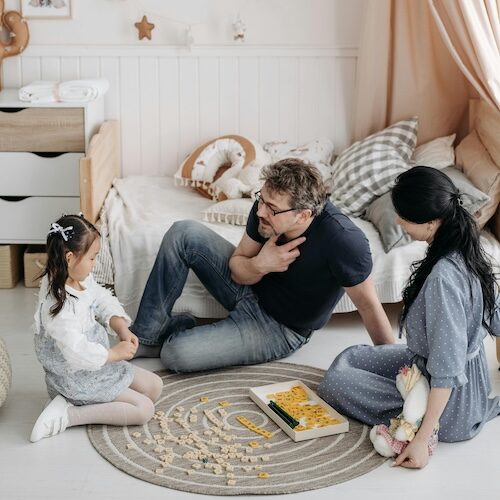As we wrap up 2025, we wanted to share some of our favorite posts from this past year. We hope that you enjoy these articles as much as we did. Please consider contributing to our year-end fundraiser https://tellthewholestory.org/ so we can continue bringing you more compelling content in the year to come.
With the school year starting, our kids are being bombarded with voices—TikTok, YouTube, school hallways, friends on the bus. The messages about sex, identity, and relationships are constant, loud, and often a mess. If we stay silent, we’re not protecting them. We’re just letting someone else do the teaching.
And let’s be real: that silence isn’t neutral. Silence teaches. It whispers, “This topic is too scary. Too shameful. Too complicated.” And kids fill in the blanks with whatever’s easiest to grab online or overheard at school.
The good news? Talking with your kids doesn’t require a specialized degree or a script. You don’t need to have every answer. You just need to be honest—and present.
WHY HONESTY MATTERS
Here’s the hard truth: most of us didn’t grow up with healthy conversations about sex. Some of us got the awkward “don’t do it” talk, others got nothing at all, and a few of us got “sex is dirty until you’re married, then suddenly it’s holy.” No wonder so many of us carry shame and confusion into adulthood.
Research is clear—when parents talk openly—not just about the biology, but the boundaries, the emotions, the values— kids make wiser choices.1They actually delay sexual activity, and when they do engage, they’re more thoughtful and safe about it. Honesty really does matter.
But here’s the kicker: our kids don’t need “perfect” honesty. They don’t need a 30-minute monologue. They need parents who are willing to stumble through it, admit what they don’t know, and invite questions anyway.
Growing up, my parents never talked with me about sex. I don’t really fault them for this, because the church didn’t talk about sex. In all honesty, I learned the most from my unchurched friends whose parents were talking about it. Unfortunately for many, we’ve taken something amazing, and we’ve made it out to be something taboo. Just because culture has distorted what God created as good doesn’t mean we need to go silence, quite the opposite. My son Silas is only 6 years old and we’re already trying to find ways to help normalize the body and talk about how we’re made, where babies come from, and anything else that simultaneously builds trust and keeps him from confusion or shame.
VULNERABILITY BEATS PERFECTION
Here’s what most parents get wrong: we think talking about sex means we need to deliver some polished Ted Talk. That’s not what your kids need. They need to know you’re safe.
Vulnerability beats perfection every time. Imagine saying something like:
“Hey, I didn’t grow up having these conversations, and honestly it feels a little weird for me too. But I don’t want you to figure this out the hard way like I did. So let’s talk.”
That’s honest. That’s disarming. And that’s the kind of openness that builds trust.
Silence shuts down questions. Vulnerability cracks the door open. And when you keep cracking the door open, over and over again, it turns into a hallway where your kids know they can walk down and find you—without fear, without shame.
THE HEART & SOUL
This isn’t just about sex ed. It’s about the opportunity to help mold your child. It’s not about getting the anatomy lesson perfect. It’s about forming hearts and habits that point toward integrity. And the way we help our kids grow isn’t by dodging the messy stuff—it’s by showing them what truth looks like when it’s lived out.
Which means every awkward, halting conversation about sex is ultimately about something much bigger: helping our kids walk in truth and understanding, that leads to life, not a culturally twisted, shallow counterfeit.
Let’s hit the nail on the head. Silence screams, ‘Don’t ask me questions!’ The kid/kids you love don’t need a silent parent. They need a safe one.
PRACTICAL MOVES TO BUILD TRUST
- Make it ongoing. Forget “the talk.” Think small, repeated conversations—when you’re in the car, watching a show, or debriefing something they saw online.
- Use real words. Say “penis” and “vagina.” It won’t kill you. It normalizes the body God made and keeps shame from creeping in.
- Contextualize what they see. If porn comes up—and it will—say, “That’s not real. That’s performance. Let’s talk about what’s true, safe, and respectful.”
- Invite the awkward questions. Even if you don’t know the answer, honesty goes a long way: “I don’t know, but let’s figure it out together.”
YOU’VE GOT THIS
These conversations aren’t about information transfer. They’re about trust. They’re about integrity. They’re about being the kind of imperfect but present parent who says, ‘I’ll walk with you in the mess. I won’t let shame have the last word.’ This is your chance to step in with love, even if it feels awkward—and you’re not stepping in alone. The very act of showing up tells your kids: you matter too much for me to stay silent. Because if you don’t disciple your kids in truth, the world is already discipling them in lies.”
1 Grossman, J. M., Tracy, A. J., Charmaraman, L., Ceder, I., & Erkut, S. (2014). Protective effects of middle school comprehensive sex education with family involvement. Journal of School Health, 84(11), 739–747.


